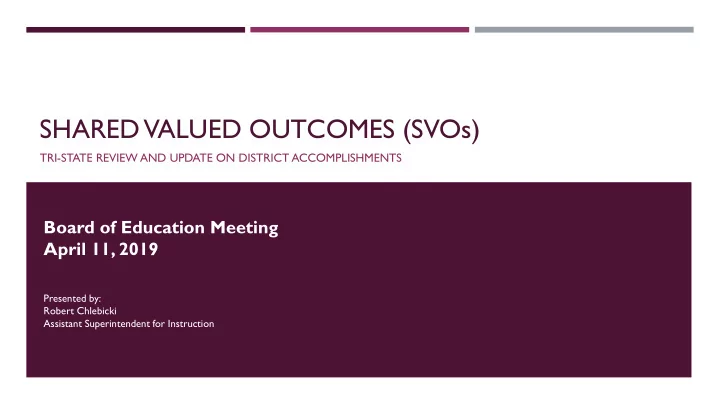

SHARED VALUED OUTCOMES (SVOs) TRI-STATE REVIEW AND UPDATE ON DISTRICT ACCOMPLISHMENTS Board of Education Meeting April 11, 2019 Presented by: Robert Chlebicki Assistant Superintendent for Instruction
TRI-STATE REVIEW SPRING 2018
TRI-STATE REVIEW – District Committee Goals District Committee (Chaired by L. Nimmo/R. Chlebicki) 4 Parents 3 Teachers 3 Administrators Goals of Committee Digest Report and Consultancy (Audio) Develop Action Items for Recommendations
RECOMMENDATIONS – Elementary Schools Meeting/Planning Time (Common Grade-Level & Across Grade and School) Share Ideas Increase Awareness of Grade Level Accomplishments Develop Common Units/Projects Promote Articulation of Work Professional Learning Practice Peer Coaching Engage in Instructional Rounds Grade Level Outcomes Develop Models Identify Benchmarks Student Friendly Version
RECOMMENDATIONS – Middle School Meeting Time Discuss and Plan Opportunities for Discussion Potential Benefits in Addressing SVOs by Grade Level/Subject Awareness of Expectations from Grades 5-6 and Grades 8-9 Ways to Identify Frequency of SVOs Addressed Communication with Parents Dedicated Time Increased Ongoing Deepen Understanding Increased Focus (e.g. report cards)
RECOMMENDATIONS – High School School District vs Individual Autonomous Schools SVOs and IB Learner Profile Build Understanding of Overlap and Natural Extension Integrate Frameworks Develop Transition Plan from K-8 to 9-12 to Honor and Further SVO Work
DISTRICT ACCOMPLISHMENTS UPDATE
SHARED VALUED OUTCOMES AND DESCRIPTORS NORTH SHORE DISTRICT SHARED VALUED OUTCOMES PROBLEM SOLVERS - individuals who find solutions in conventional and/or innovative ways. Problem solvers: We strive to support the growth of all North Shore Students as… o wrestle with the discomfort of inconsistencies, contradictions, and multiple perspectives prior to taking the time to resolve difficulties and/or find solutions. COLLABORATORS - individuals who work with others towards a common goal. o identify and/or ask questions that contribute to solutions. Collaborators: o use various criteria to select and/or test a variety of strategies and/or solutions for o know and assume responsibility for their role in a given situation (e.g. follower, their effectiveness. leader) acting flexibly based on the strengths/limitations of each member of the o revise thinking and/or action when necessary. group and self. o resolve. o support and encourage each member of the group in his/her role. are aware of, seek, and genuinely consider the ideas/perspectives of others. INNOVATORS - individuals who are driven to conceive what doesn’t exist and bring new o ideas to fruition. Innovators: exercise flexibility and willingness to compromise. o o imagine and/or envision what could be o seek, reflect upon, give and use feedback (verbal/non-verbal) from others to experiment with ideas. o enhance the work of the group. o design and/or act on plans to make original ideas tangible and/or more useful. o apply solutions that meet new requirements, unarticulated, or existing needs in COMMUNICATORS - individuals who articulate thoughts, feelings, information and ideas order to impact self, others, and society within local to global communities. using oral, written, and non-verbal communication skills in a variety of forms and contexts. generate new ideas/new ways of looking at the world. o Communicators: o elaborate, refine, analyze, and/or evaluate ideas in order to improve and maximize o listen and observe carefully, openly, actively, and objectively to clarify and/or creative efforts. deepen understanding and decipher meaning, including knowledge, values, o demonstrate originality and/or inventiveness in work and understand the real attitudes, and intentions. world limits to adopting new ideas. o use communication with clarity, accuracy, and precision for a range of roles and purposes (e.g., to acknowledge, affirm, inform, instruct, inspire, persuade, clarify). COMMITED INDIVIDUALS - individuals who exhib it dispositions and ‘habits of mind’ that select and utilize optimal/most appropriate media and technologies relative to the lead to: o purpose/task of the intended outcome and judge their effectiveness a priori as well o Growth in Self as people who : as to assess their impact. commit to understand and make meaning of learning. take initiative and/or risks. THINKERS – individuals who activate their mind for a variety of purposes. are reflective and/or metacognitive. Characteristics/types of thinkers include , but are not limited to… attend to clarity, precision, and accuracy of outcome. persevere (Intellectually and/or behaviorally). o understand disciplinary, interdisciplinary, and trans-disciplinary concepts: their exhibit adaptability. discreteness, interrelatedness, and/or universality. live curiously and/or explore complexity and/or simplicity. use various types of reasoning (inductive, deductive, etc.). o seek feedback from others o strive to understand the complexity of issues. invite, learn from, capitalize on, and persist in the face of mistakes, o consider mental models and how they reflect current reality and/or affect future challenges, failures, and/or successes. issues. analyze how parts of a whole interact with each other to produce overall outcomes o Concern for Others as people who: o make ethical choices. and/or complex situations. listen, think, and act empathetically. o analyze and/or evaluate evidence, arguments, claims, alternative points of view embrace and value diversity. and/or beliefs. contribute/commit to society. synthesize and/or make connections between information and/or arguments o think and/or act with global-mindedness. o interpret information and/or draws conclusions. acknowledge and honor the work of others o reflect on learning experiences and/or processes. o try different approaches and methods seizing upon opportunities to learn The above-mentioned descriptors are offered, not as limits but as just some of the characteristics of the six categories of shared valued outcomes of a North Shore student.
MULTIPLE REPRESENTATIONS OF SHARED VALUED OUTCOMES
SKILLS AND DISPOSITIONS OF SHARED VALUED OUTCOMES THINKERS COMMUNICATORS (Expressive and Receptive) (Critical, Creative, Reflective) SKILLS AND DISPOSITIONS SKILLS AND DISPOSITIONS Plan Question Deliver Process Information SKILLS SKILLS Make Meaning and Exchange Develop Explanations Monitor and Adapt Generate Possibilities Reflect Reflect Meta-cognate Accurate and Precise Adaptable Inquisitive and Imaginative Attentive and empathic Systematic and Strategic DISPOSITIONS Composed Judicious Introspective Truth-seeking DISPOSITIONS Objective Open-minded Reflective and Metacognitive Open-minded Perceptive Resourceful Strives to understand and be understood
Recommend
More recommend